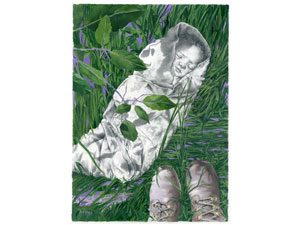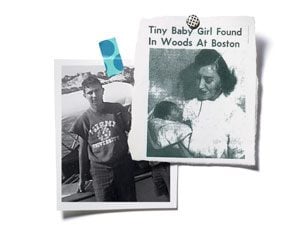Then he heard an odd cooing that sent a chill down his spine. “Did you hear that?” he asked his grandfather Clay Smith.
“I think it’s probably an animal,” Clay replied.
David had been listening to animals all day. This was different. He stood up. “I want to see what it is.”
David followed the sound along 60 or 70 yards of fence that separated the country road from the forest. The cooing seemed to be coming from the woods. He swung his leg up and over a fence post, avoiding the barbed wire that jutted from the top, and looked down. There was a baby.
Overgrown weeds and brush formed a matted jungle three feet deep, and lying in a tangle of weeds was a tiny, dark-haired baby girl, loosely swaddled in a wet white towel. David jumped down. “There’s a baby here!” he yelled to his grandfather.
At David’s shouts, Clay came running. “Don’t touch,” he cautioned the boy. “Let me see.” Clay peered down at the newborn. The towel had come partly open, and he could see a piece of umbilical cord still attached to her belly. Blood from cuts on her left arm and torso—from the barbed wire, perhaps, or tree branches—had stained the towel red in spots. David knew next to nothing about babies, but to his eye, this one looked impossibly tiny and frail. Her lips were blue, but she was alive.
“We better not touch her,” David’s grandfather repeated. “We might do more harm than good. We’ve got to get her help right now.” Reluctantly, they left the baby in the grass and sped to a nearby farmhouse to call the police. Soon, a deputy sheriff whisked the baby to Richmond’s Reid Memorial Hospital.
That night at the hospital, David described to the police over and over the sound he had heard and the shocking sight of a baby in the grass. He overheard the officers discuss the wet towel—a clue, they thought, that the baby had weathered an early-morning rainstorm that had pushed temperatures into the 50s. No wonder she had been so frail and cold, David thought.
David and his grandfather knew the baby had been suffering when they found her, but in the following days, neither the sheriff nor the hospital would tell them anything new. They did learn, however, that social workers had named the baby Roseann Wayne—Rose for Richmond’s nickname, the Rose City, and Wayne for the county name.
A few months later, David was called to the principal’s office at the junior high school, where he was surprised to meet two nurses. One of them held out a baby wrapped in a blanket. “Dave,” one said, “we brought her to you to say goodbye. She’s being adopted.” Eagerly, he held Roseann for the first time, admiring how healthy she looked compared with the pale infant who’d clung to life in the forest.
The year was 1955.
Over the years, David’s grandpa Clay had tried to track down Roseann’s whereabouts, but he couldn’t get past Indiana’s sealed adoption records.
For his part, David tried to put Roseann out of his mind and move on. After graduating from high school in Richmond, David served three years in the Army, then joined his parents and grandparents in Florida, where they’d moved. He got a job building houses and designing air-conditioning systems. In 1966, he married his wife, Gaile, and soon they were raising two sons. David and Gaile moved to Vonore, Tennessee, in 2006.
As full as David’s life was, the memory of the blue-lipped baby in the woods often surfaced in his mind. “It hurt me to realize that somebody put her out there to die,” says David. Even though he didn’t expect he’d ever see Roseann again, he couldn’t help wondering if she was healthy and happy.
Gaile understood that he fretted about Roseann as if she were his own flesh and blood. Sometimes she would catch him on their back porch, staring off into the distance. “I would see the ache in his eyes,” she says. “He’s never stopped thinking about the baby he found.”
On yearly fishing trips back to Richmond, David made the rounds from the sheriff’s office to the hospital to the newspaper, but he never heard anything new. Besides a few old newspaper clippings, “it was as if she never existed,” David says.
As a child, Ellen loved her adoptive parents, Merwin and Marga Test, but she hated the scars that roped down her left side, from face to arm to torso. “Where did these come from?” she’d ask her mother. “Sometimes when you adopt children, they have scars,” was all her mother would say.
When Ellen asked where she had come from and who her birth parents were, her parents seemed to dance around the questions. Ellen knew they were hiding something.
Still, the Tests assured Ellen that being adopted meant she was chosen, a special kid; the swimming lessons, ballet classes, birthday parties, and camping trips they lavished on her proved the point. Her family moved from Maryland to a small town in California the summer Ellen was nine, and in time her parents even bought her a horse to ride.
In 1982, at 27 and with two small kids of her own, Ellen decided to pursue the puzzle of her mysterious beginnings. According to her birth certificate, she’d been born in Richmond, Indiana, where her adoptive grandparents and cousins still lived. If any dark secrets were buried, she suspected, Richmond was where she would dig them up. So that summer, she flew to Richmond from California to start her search.
At the Wayne County Courthouse, a clerk produced a thick file: Ellen’s adoption records. Then, thinking twice, the clerk said, “You can’t see it. Indiana has a closed-records law.” Fighting the temptation to snatch the file from the clerk’s hands and run, Ellen marched across the street to the library, where she dug up reels of newspaper microfiche from September 1955, her birth month. She hoped to find a hospital birth announcement. But within 15 minutes, she was staring at a front-page headline: “Tiny Baby Girl Found in Woods at Boston.”
On September 22, 1955, the story said, a 14-year-old boy named David Hickman had heard a strange noise that turned out to be that of a newborn infant. Below the headline was a black-and-white photo of a nurse cradling a dark-haired baby. Wow, that’s really sad, Ellen thought. Then: Wait a minute. That could be me.
That night, Ellen tracked down a phone number for Corky Cordell, the town sheriff mentioned in the article. “Mr. Cordell,” she said, “do you remember a baby girl found in the woods 27 years ago?”
“Yes!” he blurted. “You live in California, and you have two children!”
Ellen was astounded. “How do you know that?” she stammered.
“I’ve been following you all your life,” he declared. Cordell explained that the sheriff’s department never identified her biological parents. A caseworker had placed her with a couple who had local ties but lived in Maryland—the Tests, Ellen’s adoptive parents. The Tests’ annual Christmas card to the local adoption caseworker kept Cordell apprised of Ellen’s life over the years.
Cordell also told her that her name hadn’t always been Ellen. For three months, she’d been Roseann Wayne.
The truth about her identity left Ellen shell-shocked. Back in California, her father, at last resigned to talking about Ellen’s history, explained that he and his wife had thought the truth was “too horrific.” Maybe they were right, Ellen thought. It sickened her to think that anybody could abandon a baby in the woods.
Before leaving Richmond, Ellen had found an address for the only David Hickman listed in the local phone book. She had questions, yes, but mostly she wanted to thank him. But the address turned out to be the wrong David Hickman. The David Hickman who’d found her, by then a 41-year-old man, had moved away.
OK, Lord, she thought, if I’m ever supposed to meet him, you’re going to have to arrange it.
In 2013, at 73, David was ready to give up and move on—“I guess I’m not meant to find her,” he’d tell Gaile—when a mutual acquaintance recommended he get in touch with a retired deputy sheriff named John Catey. “Let’s try this just one more time,” Gaile said to David.
They called. Catey pledged, “I’m going to do everything that I can to get you and your baby together by Christmas.” As he talked to more than 80 Richmond old-timers, bits of information started to come together. Someone knew that baby Roseann had been renamed Ellen—and that her last name started with T. The adoptive parents had moved to Arizona, or was it California? One day, luck led Catey to the home of Kevin Shendler. There Catey came across an old photo of Kevin’s aunt and uncle—Merwin and Marga Test. Yes, Kevin assured him, the Tests had adopted a baby in 1955.
On December 21, 2013, Ellen’s phone at work rang. “This is Dave Hickman,” a voice said.
“I’ve been wanting to talk to you!” Ellen responded. She rushed to put his mind at ease. “Dave, I’ve had a great life!”
David was at a loss for words. He had dreamed of this moment for 58 years. Ellen eagerly told him that she was happily married with two grown children and four beautiful grandchildren. Life was good.
Last May, after months of e-mails and weekly phone conversations, Ellen and David met face-to-face at the 4th Floor Blues Club in Richmond, Indiana. Together they drove the country road where David and his grandfather had sat skinning squirrels all those years ago. David showed Ellen the thicket of grass and branches, on the far side of a five-foot barbed wire fence, where he had discovered an infant: the baby named Roseann, aka Ellen Test. Had he been ten feet to either side of the fence post that he’d jumped, he might have missed seeing her. Someone had most likely lifted her over the fence and dropped her into the brush.
Ellen looked at David. “If it hadn’t been for you, I’d be dead.”
“I was guided there by the grace of God,” David says now. “For 58 years, I worried about this little baby. It’s like a fairy tale with a very bad beginning and a wonderful end.”
Source: rd.com


No comments:
Post a Comment